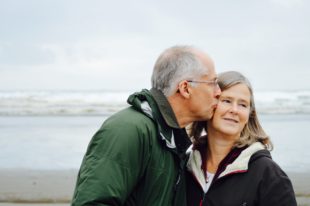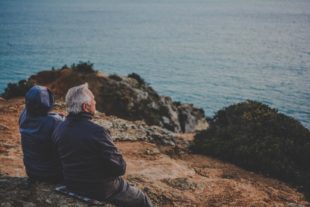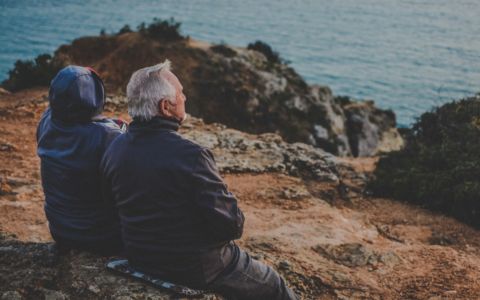Bio-Psycho-Social-Spiritual Health for Senior Citizens
Christian Counselor Spokane
When some of us turned 60 years of age — “the magic age,” for some — we started thinking we were getting old. We began to get asked whether we wanted the senior citizens’ discount. Some of our friends are dying or suffering from illnesses. Our kids are so busy with their own lives and may live clear across the country from us.
 All sorts of new thoughts begin going through our minds. Some may be discouraging, depressing, and frightening. We start to worry about retirement. We begin putting limits upon ourselves. Articles on the internet and on television begin drawing our attention to cosmetic ads to make us “look younger.”
All sorts of new thoughts begin going through our minds. Some may be discouraging, depressing, and frightening. We start to worry about retirement. We begin putting limits upon ourselves. Articles on the internet and on television begin drawing our attention to cosmetic ads to make us “look younger.”
Have you ever thought, “I’m too old to exercise,” fearing that you may hurt yourself more than you already hurt or possibly break something? Have you begun to isolate from activities you once enjoyed due to lessening of energy and/or aches and pains you are beginning to notice as you get older?
Statistics to Support the Need to Care for Ourselves as Senior Citizens
Quality of life is achieved by gaining and maintaining health of the mind, body, emotions, and spirituality. Heart Disease is the number one killer of men and women (AHA 2007). According to Janet Horn, MD and Robin H. Miller, MD (2008), lifestyle changes to decrease your risk of having a first or second heart attack or stroke are just as important as taking recommended medications, as shown by the decline in heart-related deaths between 1980 and 2000.
Horn and Miller also note, “For aging adults, the workings of the GI tract become more a cause of concern. 60 to 70 million American adults suffer from chronic GI disorders.” In 2003 the National Sleep Foundation’s “Sleep in America” poll found that two-thirds of adults over the age of sixty-five had sleep complaints; of these, 23 percent had actually been formally diagnosed with a sleep problem (Foley et al. 2007).
It is found that sleep is essential for our health and well-being. According to the World Health Organization and the two Centers for Disease Control and Preventions (CDC) surveillance systems, NHANES (national estimates) and BRFSS (state estimates), “In 2005-2008, the aging population living in nursing homes carries the highest number of the adult population to have been diagnosed with depression. Beginning in 2004, mental illness as a primary diagnosis was found in 18.7% of 65- to 74-year-old residents and 23.5% over the age of 85.”
According to MHA, “While depression is not a normal part of the aging process,” depression occurs when other physical health problems” become apparent. “Unfortunately, symptoms of depression are overlooked and untreated when they coincide with other medical illnesses.”
The good news is that depression is treatable. “More than 80% of all people with depression can be successfully treated with medication and psychotherapy. Hope and health is on it’s way!
Let’s Change the Statistics with Knowledge
 Mark E. Williams, MD (2016) quotes, “For the first time in human history, many of us can realistically expect to live on to old age.” Sounds daunting to some and exciting to others. On an encouraging note, Williams notes, “Intellectually, when we take advantage of new opportunities to learn and grow, we thrive.” He goes on to say, “With an occupation we enjoy, we work with zest and competence well beyond the traditional age of retirement.”
Mark E. Williams, MD (2016) quotes, “For the first time in human history, many of us can realistically expect to live on to old age.” Sounds daunting to some and exciting to others. On an encouraging note, Williams notes, “Intellectually, when we take advantage of new opportunities to learn and grow, we thrive.” He goes on to say, “With an occupation we enjoy, we work with zest and competence well beyond the traditional age of retirement.”
We have wisdom that comes only with life experiences and age, “and having experienced life in all of its phases.” We have great wisdom to share with our children, grandchildren, and great grandchildren. Ecclesiastes 9:16 says, “Wisdom is better than strength” (KJV). Ecclesiastes 8:1 says, “A man’s wisdom maketh his face to shine” (KJV). As the saying goes, “Been there done that.”
Exercise
There are many types of exercise that can fit within our physical abilities. Physical exercise that meets our abilities is so important in our lives, both physically and mentally. Dr. Williams notes, “Exercise has potent effects on the body’s biochemical mechanisms of growth and repair, which are constantly counterpoised against the biological processes that cause decline and decay.” He further notes that exercise can harness the benefits of the inflammatory response.
Meditation and Yoga
Meditation and yoga can be a spiritual experience as well as a source of relaxation and exercise. In their book, A No-Nonsense Approach to Staying Healthy After 50, Drs. Horn and Miller suggest, “Other forms, such as mindfulness meditation, are oriented toward stress reduction and healing.”
They go on to inform us, “There have been quite a few studies of the physiologic effects of transcendental meditation and mindfulness meditation. One study of patients on blood pressure medication were able to significantly lower their blood pressure and discontinue some of their blood pressure medication more often than those who were given general relaxation tips (Parati and Steptoe 2004).”
Meditation has been utilized for stress reduction. If you can put 14 male group members to sleep through meditation, that’s something. “Meditation has been used for stress reduction, anxiety, depression, chronic pain, cancer, HIV/AIDS, and sleep disorders” (Bonadonna, 2003).
 Yoga is considered a form of exercise to some, a form of relaxation to others, and can be a form of meditation to others. Yoga can restore balance and joint strengthening. However it is possible to cause physical injury to yourself, so you would want to discuss your plan of participating in yoga with a medical professional who knows of your physical limitations. There are classes available and provided by skilled people who specialize in providing yoga to senior citizens.
Yoga is considered a form of exercise to some, a form of relaxation to others, and can be a form of meditation to others. Yoga can restore balance and joint strengthening. However it is possible to cause physical injury to yourself, so you would want to discuss your plan of participating in yoga with a medical professional who knows of your physical limitations. There are classes available and provided by skilled people who specialize in providing yoga to senior citizens.
Prayer
Drs. Horn and Miller also noted, “A survey of more than 31,000 people in 2004 by the National Center for Health and Statistics in association with the National Center for Complementary and Alternative Medicine found that when it came to prayer, almost half of those surveyed used prayer for health reasons” (Barnes et al. 2004). Prayer is a very individual experience for each one of us. It is a personal experience that can bring peace, calmness, faith, support, and joy.
Healthy Eating and Nutrition
If we stop eating, we could be experiencing depression because this can be one of the signs of depression and/or other physical ailments. We have been told throughout life how important it is to eat healthy. In his book, The Art and Science of Aging Well (2016) Mark E. Williams wrote, “Careful studies show that a number of diets are compatible with longevity and good health.”
If you believe you are not eating healthy or you are not eating enough, it can be wise to supplement, at least with vitamins. Again, check with your medical professional before making changes. I’ve been told that sometimes some supplements can interact in a negative way with prescribed medications. I take fish oil capsules and it seems to help with my cognition. I’ve also heard that turmeric helps with joint pain as an anti-inflammatory. Turmeric adds great flavor to some foods, in my opinion. Drs. Horn and Miller suggest, “Turmeric used as a spice in your food may help prevent dementia and enhances the taste of your food.”
When I was experiencing frequent colds, a close friend of mine share with me that when she was teaching first grade and battling cancer at the same time, she began taking echinacea, garlic, and vitamin C daily, and she was able to go on teaching. I was impressed and tried taking the combination for my colds, and it worked. I take echinacea, vitamin C, and garlic daily, especially during the winter months.
Drs. Horn and Miller note, “Recent studies cannot confirm this — that is, until a very recent paper looked at the combined results from many studies and found that echinacea can shorten the duration of a cold by one and a quarter day and can reduce the chances of getting a cold by half (Shah 2007).”
Memory Lapses
 Have you noticed lately that when you are multi-tasking, in the middle of it you can’t remember what you are doing? You find yourself in a room and can’t remember what you were getting or doing in that room. Or you were in the middle of a sentence and you were unable to remember a person’s name. Or your mind goes blank in the middle of a sentence. Have you lost something in the middle of multi-tasking because you cannot remember where you left it?
Have you noticed lately that when you are multi-tasking, in the middle of it you can’t remember what you are doing? You find yourself in a room and can’t remember what you were getting or doing in that room. Or you were in the middle of a sentence and you were unable to remember a person’s name. Or your mind goes blank in the middle of a sentence. Have you lost something in the middle of multi-tasking because you cannot remember where you left it?
Drs. Horn and Miller provide us with an encouraging note: “Memory lapse can happen to anyone at any age.” They go on to say, “Lack of sleep, an undiagnosed illness, too many things competing for your attention, a new medication [and I will add stress, anxiety, and/or depression] are the many reasons for memory loss. You can’t assume you have dementia.”If other memory problems occur, I would suggest you see your medical provider.
If you’ve experienced difficulty remembering, making a daily To Do list helps immensely. Drs. Horn and Miller suggest “learning a new language and doing crossword puzzles.” Eating healthy helps as well. I find going without breakfast can lead to my memory problems.
Conclusion
Dr. Mark Williams writes, “For young people, the horizons seem boundless. Then the years pass, and suddenly you cross a threshold and realize that your number of remaining years is limited.” He goes on to say, “Negative aging stereotypes can become a self-fulfilling prophecy: if you view aging and elderly people with hostility, then you have sealed your own fate.” It seems to me that the days are flying by and I have so much more to accomplish. I wish I had appreciated life more when I was younger.
As we gain the courage and acceptance we will need to take the first steps toward growing in self-worth, accepting that we are getting older, and finding peace and happiness in our lives as our bodies grow older, we need specialized geriatric health care.
We need to find a psychiatrist that prescribes medications for mental illness such as depression, anxiety, and possibly grief that specializes in geriatric psychiatry due to the way our older bodies handle certain medications. We should also seek to find a group of peers who participate in exercise at a gym, peers who socialize together as a group, and a source of spiritual support.
Many gyms in Spokane are developing programs for senior citizens. More and more physicians, psychiatrists, and mental health clinicians are realizing the importance of gaining knowledge and providing specialized care for senior citizens in Spokane. I am excited to be a part of this.
At Spokane Christian Counseling, we provide emotional and spiritual healing. If you or a loved one are dealing with some of the issues mentioned in this article, I would love to support you in any way that I can.
Janet Horn, M.D. Robin H. Miller, M.D. (2008). A No-Nonsense Approach to Staying Healthy After 50.Mark E. Williams, M.D. (2016). The Art And Science Of Aging well.Photos:
“Silhouette of Transcience”, Courtesy of Tim Stagge, Unsplash.com, CC0 License; “Sokhumi Views”, Courtesy of Elena Saharova, Unsplash.com, CC0 License; “Taking the Opportunity”, Courtesy of Esther Wiegardt, Unsplash.com, CC0 License; “Elderly Couple”, Courtesy of Katarzyna Grabowska, Unsplash.com, CC0 License




